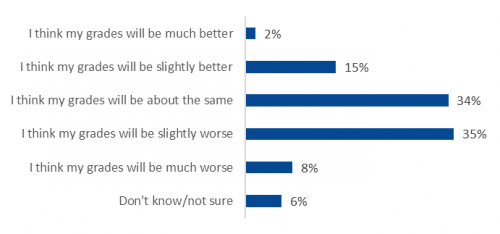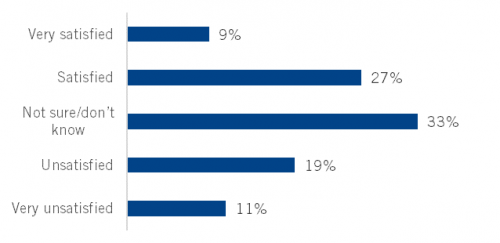Opinion
Our Research and Policy Officer Erica Holt-White discusses our latest impact brief into the affects the coronavirus pandemic is having on university applicants and students.
Typically, this time of year would be the run up to exam periods for many young people. Undergraduate students and this year’s university applicants would be working hard for exams; the results of which for applicants would determine where they then go on to study at university.
But this year both groups of young people are facing substantial challenges due to the current crisis; face to face contact for support has been lost, teaching has moved online and new assessment and grading systems have been put in place. Access to course content for university applicants and current students is also potentially restricted. Many are also likely to be facing financial insecurity due to the economic impacts of the pandemic. To better understand how the current crisis is affecting these young people, and following on from investigating the nationwide school shutdown, we have published the second impact brief in our series responding to the COVID-19 pandemic.
A level grades in a time of uncertainty
With A level (and Scottish Higher) exams cancelled, this years’ grades will be awarded differently, with teachers making guided assessments of their students’ abilities, moderated by exam regulators such as Ofqual. However, we have found many of this year’s university applicants are pessimistic about this change, with just under half (43%) thinking it will have a negative impact on their grades. Students from working class backgrounds (C2DE) were more likely to think the new system would have a large negative impact (9%) than middle class (ABC1) students (5%).
Impact applicants think new A level grading system will have on their grades
And indeed, there is real concern that students from lower socio-economic backgrounds may be negatively impacted by these changes, as teachers may unconsciously disadvantage poorer students in their assessments of their ability. While Ofqual are moderating these assessments, they are not currently planning to to adjust grades if the system is found to disadvantage those from poorer backgrounds. However it is important that the exam regulators carefully monitor the impact of the new grading system, and be prepared to make additional grading adjustments if attainment gaps do emerge.
Fair admission
Contextualising students’ results will be more important than ever in the current crisis, especially considering the negative impacts that the new system may have on the grades of disadvantaged young people. The Sutton Trust has frequently championed contextual admissions, and believes that universities should continue to apply these principles when making decisions on final places this year. There have also been reports, although so far unconfirmed, of a potential cap on student numbers at each institution. If any caps are introduced, they should be carefully calibrated to ensure they do not affect universities increasing the number of disadvantaged students gaining places, particularly at selective universities, which are the most likely to be impacted by any cap.
Given the additional uncertainty in the university applications process this year, young people are likely to need more support than ever to navigate the process. However, our research has found that while most university applicants were satisfied with the support they had from their schools with learning (68%), fewer (57%) felt the same about the help they have received with the university application process. It’s important that schools and universities are able to put in place additional help and support for these students, particularly those from disadvantaged backgrounds, who are less likely to have family members with higher education experience that they can draw on.
Furthermore, given that the moderation put in place by Ofqual for A levels this year acknowledges that there are weakness in relying on teacher assessments alone, there is also an opportunity to think seriously about how the system could be permanently improved, by removing the use of predicted grades by teachers from the system entirely. The Trust has previously called for a system of Post-Qualification Applications (PQA) to be put in place, and now is a good time to consider this change for the future.
Access to learning for undergraduates
Looking to current undergraduate students, our research also found that many lack the resources needed to access learning at home during lockdown, with 23% not having a suitable space to carry out their university work, 5% not having adequate internet access, and 6% not having sole access to a laptop or computer. Students from working class backgrounds were more likely to lack study space, and slightly more likely to lack access to internet and technology. Universities should do all they can to help, and to make sure students are not disadvantaged in assessments if they cannot access work and assessments during the pandemic.
Furthermore, some university students have experienced financial problems since the lockdown. Just over a third of students (34%) reported that they have lost a job, had reduced hours, or not been paid for work completed due to the crisis. Students from non-Russell Group universities were more likely to indicate financial issues and, alarmingly, a third of students were not sure or unaware of the financial support available from their institution.
Satisfaction with university’s actions to support students experiencing financial hardship
Previous Sutton Trust research has found that working class students are more likely to work in order to cover the basic cost of living. They are also less likely to be able to fall back on family support. Additional support from both universities and the government, such as emergency maintenance grants, is urgently needed to ensure both current students are able to continue with their courses, and that access is not harmed for this year’s applicants, whose families may be suffering from additional financial stresses due to coronavirus.
Coronavirus is impacting every corner of society, and students are no exception. Action is already being taken across the sector, for example with universities setting up emergency financial hardship funds to support their students. However, more action is needed to ensure everyone can take full advantage of the opportunities university provides, even in a pandemic. This is even more important during uncertain economic times, and will benefit students not just now, but for the rest of their lives.

